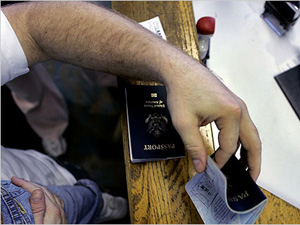
|
 |
 |
 Travel & Outdoors | June 2008 Travel & Outdoors | June 2008  
TSA Nixes Americans Flying Without ID
 Ryan Singel - Wired THREAT LEVEL Ryan Singel - Wired THREAT LEVEL
go to original


| | People who currently fly without ID get more scrutiny than the large majority of those with identification. | | |
Americans who prefer to fly without showing ID will be turned away by airport security beginning June 21, unless they can convince screeners that their driver's license or passport has been lost, according to a Transportation Security Administration policy change announced last Friday.

The TSA describes the identification rule change as the "latest in a series designed to facilitate travel for legitimate passengers while enhancing the agency's risk-based focus - on people, not things."

While signs in the nation's airports already say that identification is required, that's not the current rule. Wired.com watched two years ago when DHS adviser Jim Harper flew home from San Francisco to Washington, D.C., after handing his license to this reporter.

That worked because, under the current regulations, travelers who don't wish to show identification can opt for extra-screening instead, under secret rules made public in a case brought by civil libertarian John Gilmore. Gilmore sought to overturn the requirement on constitutional grounds, but lost when the U.S. 9th Circuit Court of Appeals ruled that Americans have a right to travel, just not necessarily by plane.

In practice, many TSA employees and supervisors do not know the ID-or-extra-search rule (it is, after all, a secret), and act flummoxed when they encounter a passenger who says they prefer not to show ID.

Under the new rules, passengers who "lost" their ID can expect to be hand-screened, have their bags searched and - according to the release - undergo "interviews with behavior detection or law enforcement officers."

Which is to say, that the TSA has essentially decided it won't tolerate people who challenge their authority or like to travel without showing their papers.

"If you say you lost your ID or have misplaced it or don't have a passport or driver's license and are cooperative and explain the circumstances, you will be subject to secondary screening," TSA spokeswoman Carrie Harman said.

Harman said she had no statistics on the number of people who actually fly without showing identification, and said the policy change was about TSA's increased focus on identifying threatening people, rather than things.

Despite the looming change in policy, the TSA has still yet to close the large security loophole, which allows someone to bypass the no-fly list by buying a ticket under another name, check in online, then getting through security with a second, fake boarding pass bearing their real name.

This hack was most recently brought to light by security researcher Christopher Soghoian, whose home was raided by the FBI after he created an online fake boarding pass generator to bring attention to the hole.

Now, travelers who wish to fly without identification will have to dissemble about their motives or lie about having identification on their person. Additionally, the new policy explicitly requires ID-less fliers to be "cooperative."

The new policy certainly is a good way to enforce obsequiousness to authority, but it's got nothing to do with security. In fact, if the TSA's extra-screening processes are any good, people who currently fly without ID get more scrutiny than the large majority of those with identification.

THREAT LEVEL would like to give the TSA some credit, however. At least, they announced the rule. The ID-or-extra-search rule it supersedes was considered "sensitive security information," and was even described by the government in a court filing as unchallengeable since it was a "law enforcement technique," not a rule. | 
 | |
 |



